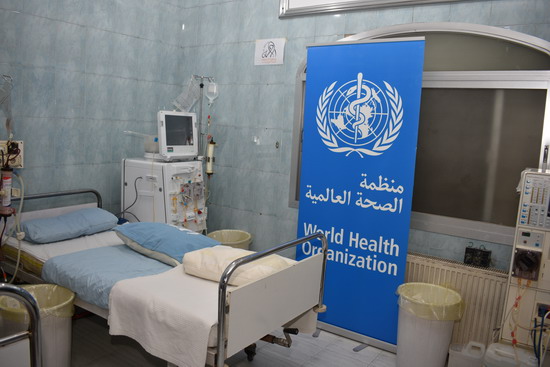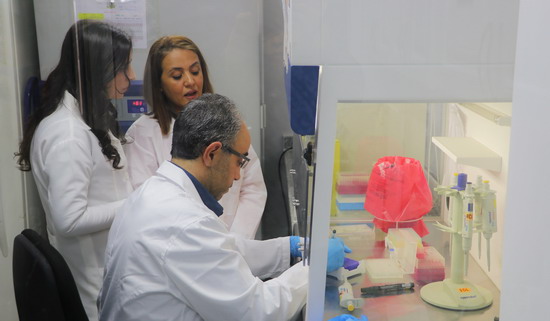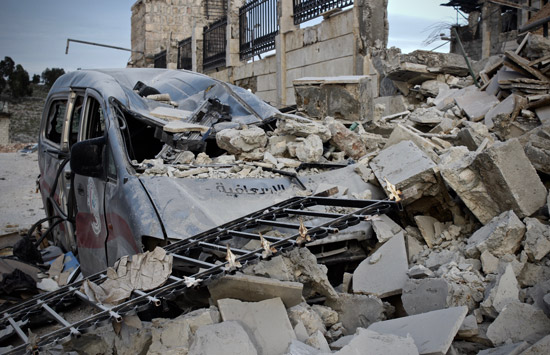Saving lives in Syria with support from Norway
 19 April 2020 - Generous funding from the Government of Norway during the last 4 years has enabled WHO to reach more than 1.4 million beneficiaries in Syria and improve their access to primary health care services through 40 nongovernmental organization partners.
19 April 2020 - Generous funding from the Government of Norway during the last 4 years has enabled WHO to reach more than 1.4 million beneficiaries in Syria and improve their access to primary health care services through 40 nongovernmental organization partners.
From 2016 to 2019, Norway provided flexible funding to WHO Syria totalling more than US$ 34 million. Of this, nearly US$ 2.7 million was directed to national NGOs operating within the health sector, allowing WHO to scale up its interventions across the country and access hard-to-reach areas.
“Norway has been among WHO’s key partners throughout the crisis in Syria. Its generous contributions enabled WHO to continue providing health facilities with needed medicines, medical supplies and equipment, as well as mobile clinics and ambulances, facilitating the provision of health care services to patients across the country,” said Dr Nima Abid, acting WHO Representative in Syria.9-year-old Ahmad from Al Hasakeh governorate suffers from polycystic kidney disease and needs 3 haemodialysis sessions every week to survive. “Last year we were displaced more than 3 times and had to travel very long distances to reach Al-Ihsan haemodialysis centre in Aleppo,” his mother said. “And if it were not for this centre treating my son, I would have lost him years ago. I have already lost my husband and will do everything in my power to keep my son safe, despite all the hardships he has been through.”
Al-Ihsan haemodialysis centre is one of many WHO-supported facilities that is able to remain functional thanks to the Government of Norway.
“We appreciate WHO’s immense support for the provision of haemodialysis sessions, among other lifesaving treatments,” said Dr Mohamad at Al-Ihsan haemodialysis centre in Aleppo. “With the regular supply of sessions, the centre is able to provide care and manage many cases,” he added. “WHO’s support to our centre has contributed greatly to fulfilling our mission as doctors and helped us save more lives. Despite all the challenges each one of us is facing, saving the lives of people like Ahmad is what matters at the end of the day.”
WHO continues to support the fight against coronavirus in Syria
 2 April 2020 – The World Health Organization (WHO) is working closely with the Syrian Ministry of Health to enhance Syria’s preparedness and response to COVID-19. WHO’s support focuses on 4 main priorities:
2 April 2020 – The World Health Organization (WHO) is working closely with the Syrian Ministry of Health to enhance Syria’s preparedness and response to COVID-19. WHO’s support focuses on 4 main priorities:
- enhancing surveillance and expanding laboratory testing for early detection of cases;
- protecting health care workers by providing them with protective equipment;
- ensuring proper case management, isolation and contact tracing; and
- raising awareness and conducting risk communication.
“WHO classifies Syria as among the high-risk countries in the Eastern Mediterranean Region, as a result of challenges in the health system resulting from over 9 years of conflict in the country,” said Dr Nima Abid, acting WHO representative in Syria. “WHO continues to aggressively support the health sector in Syria to ensure its preparedness and response to combating COVID-19 in the country.”
In 4 years, 494 attacks on health killed 470 patients and health staff in Syria
Every 4 days in 2019, a health facility in Syria was attacked. A majority occurred in the northwest, where the world‘s most urgent humanitarian crisis continues to unfold.
 March 2020, Geneva/Copenhagen/Cairo – The World Health Organization condemns in the strongest terms, attacks on health care that have been a hallmark of the complex humanitarian crisis in Syria that this month enters its tenth year.
March 2020, Geneva/Copenhagen/Cairo – The World Health Organization condemns in the strongest terms, attacks on health care that have been a hallmark of the complex humanitarian crisis in Syria that this month enters its tenth year.
“The data we can now reveal on attacks on health in Syria is a grim testament to a blatant disrespect for international humanitarian law and the lives of civilians and health workers,“ said Richard Brennan, WHO‘s Regional Emergency Director in the Eastern Mediterranean.
Of all armed conflicts across the globe, Syria has for years been one of the worst examples of violence affecting health care. Intentionally attacking sites where the sick and wounded are treated, to either restrict or deny civilians access to health care, is prohibited under international humanitarian law. Indiscrimate attacks in civilian areas can also result in damage to health care, reflecting a callous disregard for lives and welfare of the most vulnerable.
“What is troubling, is that we‘ve come to a point where attacks on health – something the international community shouldn‘t tolerate - are now taken for granted; something we have become accustomed to. And they are still taking place. Only 2 weeks ago, 2 hospitals in Idleb governorate were carried out, injuring 4 health workers and temporarily suspending services,“ said Brennan.
A total of 494 attacks on health were confirmed between 2016 and 2019,1 of which 68% or 337 attacks were recorded in Syria’s northwest; among the last areas in the country that are not under government control. The data show that attacks on health in Syria peaked in 2016 and were lowest in 2019, likely due to the reduced size of the area where active fighting was taking place. The fact that the northwest – Idlib, Aleppo and Hama – has suffered the lion’s share of attacks compared to other regions in Syria, is notable. In 2019, 82% occurred in the northwest, 49% in 2018, 58% in 2017 and 85% in 2016.
The total death toll in attacks on health care in Syria between 2016 and 2019 is 470, peaking in 2016 with 241 confirmed deaths. The lowest number of deaths recorded was in 2019 at 54, again due to the reduced territory undergoing military operations. Northwest Syria represents the highest total numbers of deaths in those 4 years – 309 or 66%.
In addition to the deaths, 968 people were injured by these attacks across Syria since 2016; many of whom have been left with permanent disabilities.
“A clear example of how conflict impacts an individual’s right to health is northwest Syria, where today only half of 550 health facilities remain open either due to insecurity, damage from previous attacks, threats of future attacks, or surrounding areas being completely deserted as people are forced from their homes,” Brennan marks.
“Health facilities are now the least safe places in the area,” said one physician, a few days after 2 hospitals in Darat Izza were hit in an airstrike on 17 February 2020. Another physician working in a child and maternity hospital in Harim in Idleb governorate, described to WHO how he and his medical team worked in constant fear of shelling.
In September last year, an internal UN Board of Inquiry started investigating a series of incidents in northwest Syria, since the signing of a Memorandum on Stabilization of the situation in the Idlib De-escalation area between the Russian Federation and the Republic of Turkey on 17 September 2018.
The investigation covers destruction of or damage to facilities on the deconfliction list, containing UN-supported humanitarian sites such as health facilities. The previous month, two thirds of the United Nations Security Council requested an inquiry based on the suspicion that making their location public through deconfliction had made these facilities a target and that some of the attacks had been deliberate. The Board of Inquiry has yet to present its findings.
So far, in 2020, confirmed attacks on health in Syria are 9 – all of them in the northwest - resulting in 10 deaths and 35 injuries.
For more information:
Hedinn Halldorsson
WHO Gaziantep
+90 538 544 29 57
Inas Hamam
WHO Regional Office for the Eastern Mediterranean
+20 01000 157 385
_________________________
1. Two systems for data collection of attacks on health care were used within this period; secondary data from WHO‘s Health Cluster in Syria and findings previously published in the Lancet, covering 2016-2017, while WHO‘s Surveillance System for attacks on health care (SSA) covers 2018-2019. The two systems are compatible in that the basic methodology used for verification of incidents was the same.
WHO combats misinformation circulating on COVID-19
5 March 2020, Damascus - The World Health Organization (WHO) categorically refutes the misinformation circulating on social media that has been falsely accredited to WHO related to COVID-19 in Syria.
As per a statement by the Regional Director for the Eastern Mediterranean published on Tuesday 3 March, 2020, "1682 cases of Covid-19 disease in 14 countries in the Eastern Mediterranean Region, as of 2 March, at 6 pm local time in the city of Cairo, including 66 reported deaths in Islamic Republic of Iran.” Syria is not among these 14 countries.
WHO is working closely with the Syrian Ministry of Health with the aim of enhancing health preparedness and response to COVID-19, in accordance with the International Health Regulations (IHR 2005). Under this agreement, any cases of COVID-19 or other communicable diseases are directly reported to WHO.
WHO is working with the Ministry of Health on a daily basis on ensuring preparedness measures for the disease. WHO continues to provide technical guidance and support to the Ministry of Health. Public health laboratories in the Ministry of Health have been provided with laboratory kits sufficient to test a thousand people to diagnose potential COVID-19 cases.
WHO is also woking with the Ministry on raising public health awareness and encouraging healthy hygiene practices such as washing hands with water and soap frequently, following correct coughing and sneezing protocols, and avoiding crowded places. All these are key to protecting people from COVID-19.
According to WHO’s Director General, "our first enemy is not the virus; it is rather fear, and rumours about it." WHO recommends that only reliable sources of information such as WHO’s website and Ministry of Health platforms be used when verifying any information related to COVID-19.
Statement by the Regional Director Dr Ahmed Al-Mandhari on COVID-19 in the Eastern Mediterranean Region
3 March 2020
More information and guidance from WHO regarding the current outbreak of novel coronavirus


